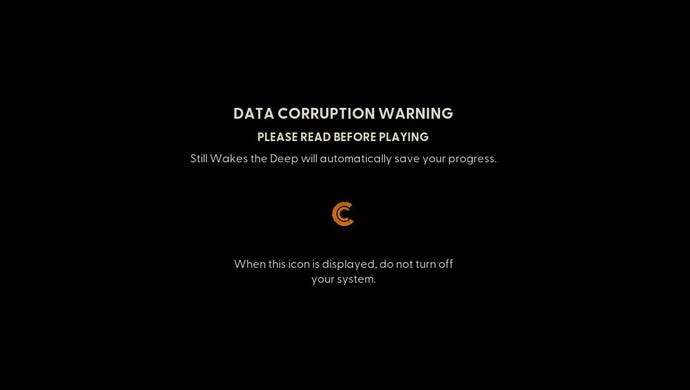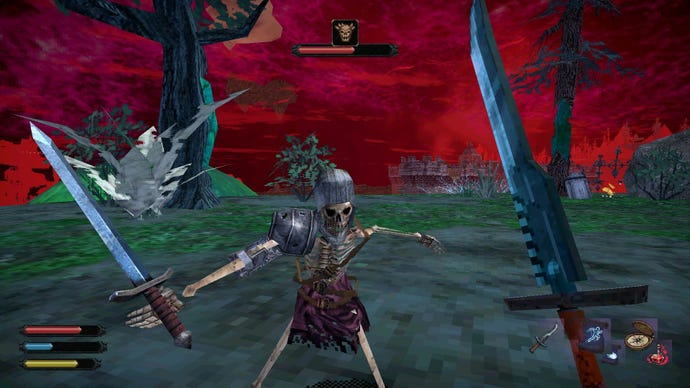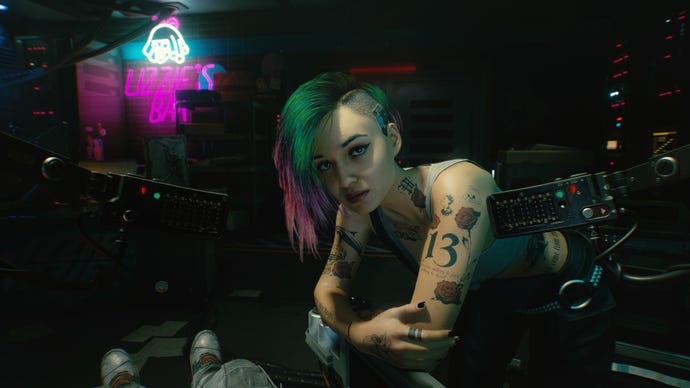We’ve all seen it. The small rotating symbol that warns players against impatient power-down actions. “Do not turn off your system when this symbol appears,” says the message often seen when launching a game (or some other version of these words). The implication is clear. The backup process is delicate, and if you interrupt this invisible ritual, the data being written to a folder deep inside your computer will be corrupted, destroyed, corrupted. You will lose all your progress, all your precious swords and achievements.
But is this true? How likely are you to? really suffer a catastrophic loss of shells? To find out, I decided to spend a very annoying afternoon turning my gaming rig off and on during multiple games. Was this a good idea? I do not know. I’m a gamer, not an ideas guy.

This is not an extremely scientific experiment. It’s easy. In each game I’ll hit a save point, look for the corresponding “now saving” icon, and press my “off” button while the icon appears. Sometimes savepoints will be manual, sometimes they will be location-sensitive automatic. In all cases I time the shutdown as best I can. Sometimes I do the act several times, sometimes I only do it in pairs. It’s worth noting that I only use the “off” button on my computer. Fear prevents me from cutting power to the wall during this process. This is the scarier version of the same experiment. As we’ll see, it can make a big difference.
To help me understand the reasons behind this symbol, I’ll also be talking to Getting Over It developer Bennett Foddy. Which feels appropriate for an experiment that involves restarting something repeatedly.
But first, let’s see what happened. Catastrophic data loss? Or sweet alpha foxtrot? Read on to find out!
Hadi 2

Mel’s violent rampage through hell is often automatically saved. It saves between rooms, saves after getting perks, after upgrading your skills at the altar, after getting food after battle, and probably a bunch of other places I haven’t noticed. Statistically, someone out there has had a power outage at the worst possible time, right? Well, I tried to emulate him and destroy my save file a few times while his magic “now saving” glyph appeared. Nothing happened. Every time I booted my computer back up and ran the game, I was safe and sound. It didn’t even take me a step back.
Outcome: No data loss.
Still awakens the depths

The save icon in this first-person horror is a set of spinning circles in the corner of the screen. I tried the same self-destruct power by interrupting, interrupting during a save in many different places on board the oil rig. Nothing went wrong. It is perhaps reassuring to learn that the Chinese House game is stronger than the rusting machine used by the cheap oil fiction company Cadal.
Outcome: Absolutely hell.
Terrible delusion

Dread Delusion’s save points are ornate constructs that hold shiny crystals, and the save icon is dusty old text, again in a corner of the screen. Of all the games I’m trying to corrupt, I harbored a perverse hope that this pretty good retro RPG would fall victim to my sabotage. It was made by a small team, I figured, maybe they wouldn’t have time to make their storage process absolutely harmless. But no. Even after many efforts there was no corruption, no data loss, no disaster.
Outcome: Getting really annoyed entering my windows password.
Cyberpunk 2077

The save process in Cyberpunk 2077 takes milliseconds. The little rotating “don’t turn off” icon appears and disappears too quickly for me to react. To simultaneously cut the power and save the game, I would need a second person to help with the process. We’d have to handle it with the spectacle-correcting precision of a pair of military scientists, counting down and turning switches at the same time. It’s theoretically possible for your save data in this game to get locked randomly, but you literally couldn’t if you tried.
Outcome: I’m sorry for starting this pointless experiment.
Alien: Isolation

Aha. Here’s one that counts down for you. Alien: Isolation’s save slots are a thing of beauty, as they are actual physical slots on the walls of the space station that you insert a small card device into. The required save symbol (in this case, a small tape) also appears. I stuck in Ripley’s card, waited for the save process to start, confirmed an “overwrite game” message, and immediately slapped my computer away as soon as the tape popped up. Did the famous weird machine of Sevastopol Station corrupt my save file? No. Even the idiots at Seegson electronics seem to be able to make a reliable saving process.
Outcome: I’m just glad it’s over, to be honest.
Game saved successfully
There you have. Absolutely no horror stories save data. So why do games show you this warning? Did I just get lucky? Will turning off your computer during a save really hurt, or is it just a sneaky habit of game developers?
“I think the answer is probably ‘it depends,’ unfortunately,” says Bennett Foddy, creator of Getting Over It. “Yes, if I remove the power cable from the computer or keyboard while writing the save file, the file will not finish writing and you will get a corrupted save. But, many warnings…
“Everyone I know writes a rotating batch of electronic games to handle file corruption. So if one file is corrupted, it just loads the next most recent file. But there’s no guarantee that the game you’re playing does this.
“Some games have small save files – like Getting Over It writes almost no data when saving. In those cases, you’re statistically unlikely to interrupt a save process even if you unplug the power cord. You’ll probably have to turn off the computer 100 times for being unlucky enough to corrupt a save file for that game.”
Foddy’s last point here reminds me of Cyberpunk 2077’s save process during my foray into mad science above. In that particular case, the save file might be big or small, I don’t know. But however CD Projekt RED handles it, the shooter seems to save extremely quickly, making it impossible to interrupt.
But Foddy also thinks that my method of pressing the “shutdown” button is unlikely to do any harm at all, as it starts a shutdown process which “should include terminating any files being written in progress and securely closing the drives”. Aha. So we have to repeat this under more difficult conditions, “wall power cut”.
There is another possible reason that this warning appears in so many games you play. In some cases, it may simply be forced on developers as part of the release process. As far back as 2012, Jonathan Blow, creator of Braid and The Witness, was complaining about this exact requirement in the certification process. In other words, including this warning is one of the rules that game makers must follow to ensure that their games can be sold on storefronts like the Nintendo eShop, PlayStation Store, and Steam.
“Every single game needs to say at launch, ‘sometimes this game saves, when you see this animated icon in the corner, DO NOT TURN OFF YOUR CONSOLE, etc.,'” Blow wrote in an email to Ars Technica. something that the developers have to implement and that has to be tested, which costs a lot of time and money, but worst of all, it affects the user experience, because the start of the game becomes a little more bureaucratic.”
Blow goes on to complain a lot about that certification process, essentially pointing out the same thing as Foddy – that there is a technically plausible way to create a failsafe against data corruption. Which would make the warning almost unnecessary.
“[It] it could also be a historical console requirement,” says Foddy. “I haven’t checked recently (and I suspect the license would prevent me from telling you if I did). It can also be developers who follow the knee-jerk convention. I bet that’s part of it.”
CONCLUSION
In the end, we could be none the wiser about this particular rotating symbol of uncertainty. The certification requirements alone make it likely that we’ll continue to see it used in our games for the foreseeable future. But, yeah, it seems mostly pointless. You’re more likely to lose your save file to an overzealous housemate or younger sibling than to a sudden power outage. At least judging by mine scientifically rigorous experiment anyway.
However, science is an open book. Review me, readers! How about you? Have you ever had a game corruption disaster? Have you wasted 55 hours of Persona 5 in the cybervoid? What is the most devastating loss of your life? Download your personal story to me, if we can’t always save the game reliably, at least let’s save each other.